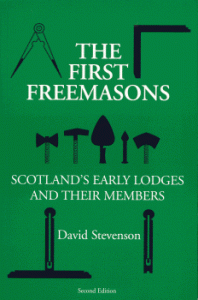The First Freemasons
Scotland’s Early Lodges and Their Members
by Dr David Stevenson
Paperback. 222 pages. ISBN 902324 65 9. £14.95
The First Freemasons. The earliest known Lodges are those in Scotland estanblished by William Schaw. Freemasonry originated in Scotland.
 Although not a Freemason, Dr David Stevenson has been driven, by curiosity, to write a most authoritative book on early Scottish Freemasonry. My first commendation must be to record how good it is to read such a wholesome work totally unaffected by the baser style of “darkness visible” with which the true nature of our Order has been vituperatively treated in the past few years. Dr Stevenson’s patient research has put in place the manner of our growth in the seventeenth century, and has put the Craft in the surviving place of being alone the one great private organisation in the native Society of our Land; constantly rebuilding and recording its affairs, because the members so loved to honour their responsibilities.
Although not a Freemason, Dr David Stevenson has been driven, by curiosity, to write a most authoritative book on early Scottish Freemasonry. My first commendation must be to record how good it is to read such a wholesome work totally unaffected by the baser style of “darkness visible” with which the true nature of our Order has been vituperatively treated in the past few years. Dr Stevenson’s patient research has put in place the manner of our growth in the seventeenth century, and has put the Craft in the surviving place of being alone the one great private organisation in the native Society of our Land; constantly rebuilding and recording its affairs, because the members so loved to honour their responsibilities.
He also shows how these responsibilities changed, and how Lodges coped with altered circumstances. Several of the most influential early Freemasons have their lives carefully considered. It may come as a surprise to learn that William Schaw was never a Reformed Christian, and that he died before his far-reaching reforms of our Craft could be implemented to the full. Had this happened, it would seem that Grand Lodge could have been inspired early in the seventeenth century.
What will hearten readers is to learn of the stabilizing nature of Lodges in the community, at a time when all Scotland was suffering from circumstances of great distress.
There will also be a chance to note Schaw’s emphasis upon the important tradition of Hermeticism, which centres its attention on the art of memory as an aid in the making of long speeches, and how this was so readily linked to practical masonry and the construction of buildings – all this leading to the creation of a mystical temple of memory where, one by one, each room yielded up its peculiar story. Had Schaw lived a little longer, Stevenson shows how much more might have been created.
In the light of present argument in Scotland and England regarding the place of Freemasonry and the Church, Dr Stevenson has used the words “startling aspect” to prove his point that all through the seventeenth century, at a time when the Church of Scotland was not known for its tolerance, no attempt was made to interfere with the rising number of Lodges or any other aspect of the private ritual which they practiced in secret.
Another possible source of difficulty is also discussed, over the relationship between Lodges situated in a city in which there also existed a Masons’ Guild incorporated by act of the Town Council. The reader is taken very carefully, and with many firm quotations, through this often complicated issue – an issue which so often tends to lead the hasty seeker of truth astray.
The subsequent chapters are devoted to many of the oldest Lodges, and their story is well if almost too minutely – told: but if you want to put real pride into your Mason’s apron, read this book quietly, bit by bit. Perhaps an occasional tinge of shame may mantle your cheek as you see how much of our robust charm has been ‘beautified” by influence from our great Southern neighbour: but, nevertheless, no country in the world can boast of so widespread, or so local, nor so powerful a personal appeal which came to so swift a penetration among thoughtful, sociable men in Society.
The book cannot be read without feeling the kindling delight which moved the author in his research, and his clarity of phrase in describing the influences which helped to propound the Masonic mysteries will be exceedingly helpful to all who would further their interest, not only of Scottish Masonry but also of the elemental thoughts which the earliest Masons found so satisfying in the creation of our fraternity
ELGIN
This book, together with its companion volume, The Origins of Freemasonry (Scotland’s Century 1590 – 1710) comprise the most comprehensive and minute examination of the earliest Masonic records in the world – which happen to be Scottish. Anyone who comments upon, either in writing or verbally, Scottish Freemasonry cannot do so authoritatively without reference to these books (Ed.).